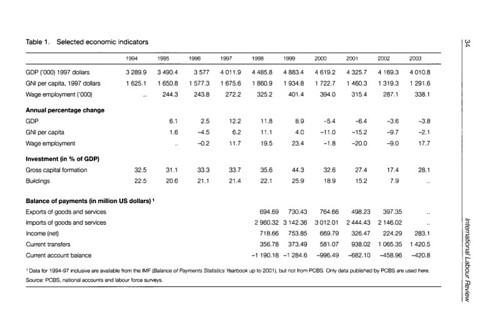Saturday, September 09, 2006
The Crisis in Palestine. posted by Richard Seymour
There has been some brief attention to the suffering being inflicted on Gaza in the media. The UN is issuing warnings of a humanitarian disaster. Gaza has some time been a vast, open-air prison, and Patrick Cockburn of the Independent has described some of the effects of the recent crackdown. There is now a general strike across Palestine by workers who have not had their wages, largely on account of the EU blockade and Israel's ongoing destruction of the Palestinian economy.Underlying this is a huge problem for any two-states solution, aside from the obvious problem that Israel would sooner destroy the Palestinians than allow a two-state settlement ever to emerge. An article by ILO economist Phillipe Egger in the most recent edition of the International Labour Review outlines the problem. The dimensions of the economic crisis being inflicted on Palestine are as follows: average per capita income has dropped by a third since 1999; unemployment consistently averages at 27% (certainly an underestimate); the number of people living below the poverty line increased from 20% in 1999 to 50% in 2003. The Palestinian economy is now much smaller than it was in 1994, and its economic contraction is actually worse than that experienced by the US during the Great Depression. The proximate cause has been Israel's imposition of tight restrictions on the movement of labour and goods in and out of Palestine. The number of Palestinians working in Israel was cut in half between 2000 and 2002. The new policy is symbolised by the 'separation wall', which not only grabbed huge portions of land while leaving the militarised Zionist settlements intact but also blocked the formal and informal economic connections across the border. These are the measures that produced such dependency on international aid. Check this table out (click to enlarge):
However, the broader issue that as a result of Israeli policy, Palestine was already largely dependent on the heavily subsidised Israeli economy. The economics of Oslo involved allowing Israel easy access to this cheap supply of Palestinian labour which in the short run allowed measurable Palestinian growth. In the long run, however, such dependency is not only a result of political domination, but is sustainable, especially given the expected growth in the Palestinian labour market. No independent state is viable without an independent economy, but Israel's incursions into the West Bank, its uprooting of farmland, destruction of hothouses, its crackdowns on aid, trade and labour have all ensured that nothing of the kind could develop in Palestine. Israel cannot, for reasons explained elsewhere, tolerate a truly independent Palestinian state. Hence the attempts at frustrating political unity in Palestine. They, like the 'international community' that has been happily starving Palestinians, will only accept a pliant, discontiguous set of bantustans under a corruptible pro-Israeli leadership.
In the meantime, the policy is one of enforced starvation, immiseration and the occasional bout of state terror.











